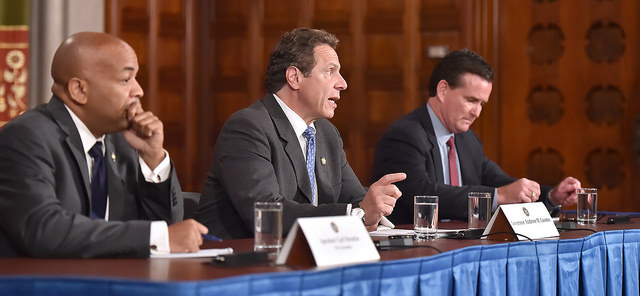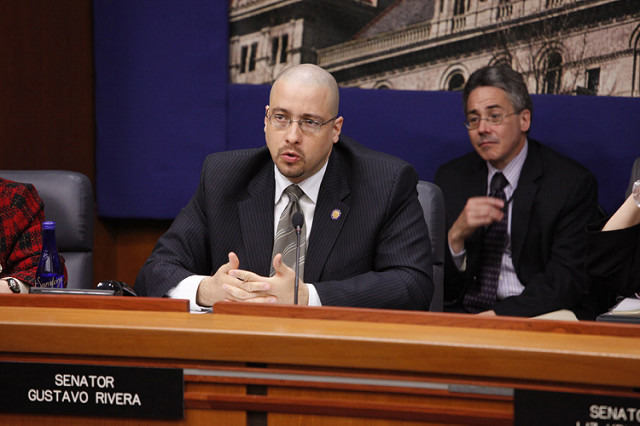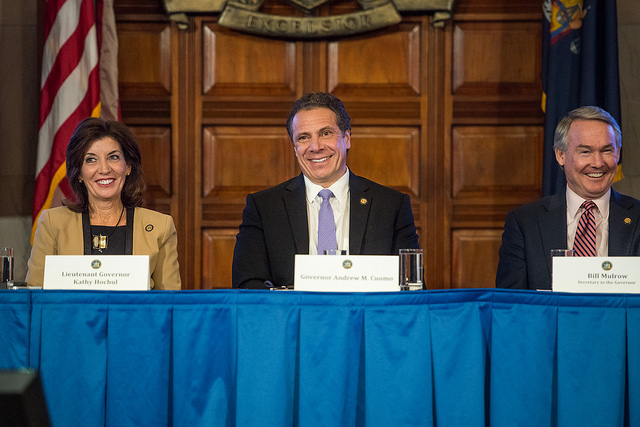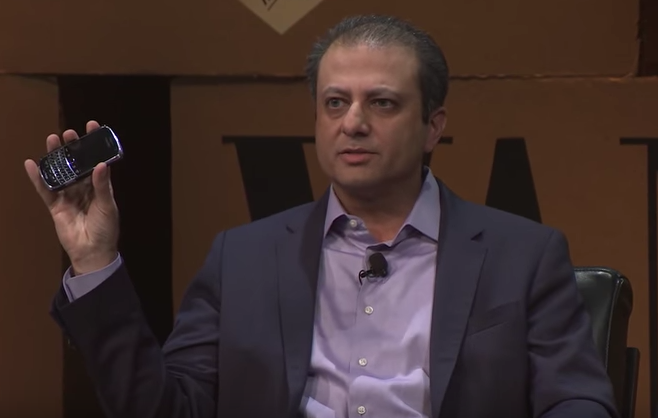With One-House Budgets Due, Key Points of Contention in Albany

Heastie, Cuomo, Flanagan (photo: Governor's Office/Kevin P. Coughlin)
With a new state budget due by the end of the month, the Senate and Assembly are finalizing their one-house budget resolutions. The one-house statements of priorities in the Democrat-controlled Assembly and Republican-controlled Senate will be passed this week, and their passage signals the official start to the negotiations that will yield a state spending plan for the new fiscal year, which begins April 1.
The one-house budgets are shaped, in part, by a series of joint legislative budget hearings that took place in February, and are non-binding proposals from each chamber, wherein they respond to Governor Andrew Cuomo’s Executive Budget.
Cuomo outlined his policy and spending priorities in January during his 2017 State of the State speaking tour, which was accompanied by a policy book, and his 2017-2018 executive budget proposal. Over the past weeks, several sticking points became clear, including a number associated with New York City interests and Mayor Bill de Blasio’s agenda.
While de Blasio has praised several elements of Cuomo’s agenda, he has also expressed concerns about several areas of proposed funding cuts to New York City, as well as the governor’s new proposal for a replacement to the affordable housing-focused property tax abatement program known as 421-a. De Blasio is also pushing heavily for a “mansion tax” that would add a surcharge on New York City homes purchased for over $2 million.
Assembly Democrats, Senate Republicans, and the influential Senate Independent Democratic Conference (IDC) have each indicated certain priorities heading into the release of the one-house budgets and final weeks of negotiation. Debates over taxes appear to be at the top of the list, with the Assembly looking for tax increases (include de Blasio’s mansion tax), the Senate looking to roll back taxes and fees, and Governor Cuomo, as usual, somewhere in between. (De Blasio’s mansion tax is almost certainly not going to pass.)
Cuomo’s Excelsior Scholarship, which would provide tuition-free city and state college to New York residents from homes earning $125,000 or less, will also be a focus of budget negotiations. The centerpiece of Cuomo’s 2017 agenda, the program hinges on the extension of the state’s so-called “millionaire’s tax,” which Senate Republicans have already made clear they oppose (and Assembly Democrats are looking to enhance). There are questions about how the scholarship program will be paid for, but also the enrollment qualifications, with a large group of Assembly Democrats proposing their own version of the plan. The IDC and Assembly Minority have indicated they prefer an expansion of the state’s Tuition Assistance Program (TAP), which would be inclusive to students at the state’s private colleges, who are not included in Cuomo’s plan.
As has become the tradition in Albany, the final budget will be determined by the proverbial “three men in a room” -- a reference to the governor and the leaders of the majority conferences in both houses, who will meet frequently, and behind closed doors, in the coming days to hammer out details. As of 2015, the state budget has been hashed out by “four men in a room,” to include IDC Leader Jeff Klein. The men will negotiate in consultation with their conferences, but they often make major policy trades and decisions just before the deadline and rank-and-file legislators wind up voting on billions of dollars in spending and major new policies without much time to review the details.
Given Republican control of the Senate and de Blasio’s frosty, if not antagonistic, relationship with Cuomo, there is increased pressure on Assembly Speaker Carl Heastie, a Bronx Democrat, to represent the interests of New York City and its mayor. While Klein, Cuomo and Heastie are all nominally Democrats, they each come from different perspectives and with different priorities. In a coalition agreement with Senate Republicans that bolsters the GOP’s razor thin majority, Klein’s now eight-member IDC typically uses its leverage to push through a key progressive issues each session. It appears that raising the age of adult criminality in New York is at the top of the IDC list this year.
At a press conference Wednesday, de Blasio responded to a Gotham Gazette question about the status of state budget negotiations by saying that Speaker Heastie and the Assembly have been “extraordinarily supportive” of city interests, and that he and Heastie recently spoke about the city’s housing needs, among other items.
“I’ve talked to him about, you know, all of the current greatest hits,” de Blasio said. “Obviously, the housing MOU is one of the ones we care about the most. We want clarity on that set of resources. It’s a lot of money. It’s $2 billion. We have no idea how it’s going to be used, there’s been no specific plan. It could be incredibly helpful to our efforts to address affordability.”
Specifically, de Blasio said, the city is concerned about the supportive housing proposal from the state, which is is supposed to provide 20,000 units. “There’s not a single unit being produced anywhere at this point. There’s no plan, there’s no timeline, we really need that,” said de Blasio. By “MOU” de Blasio was referring to a memorandum of understanding that must be signed by Cuomo, Heastie, and Senate Majority Leader John Flanagan to allocate the $2 billion set aside in last year’s budget for affordable and supportive housing across the state. Only a small portion of the money has been released.
De Blasio also mentioned his ongoing push for the state to match the city’s investment in NYCHA funding. “When I originally went to the state two years ago, I said ‘we’ll put $300 million into capital for the housing authority, please match us.’ All the state did was give us $100 million and the vast majority we haven’t seen yet, in two years,” de Blasio said. “I have since added $1 billion to capital funding for NYCHA. The least the state could do is make a serious investment in the housing authority in this budget, and I think the speaker is very sympathetic on that front.”
The mayor reiterated concerns he broached during his late January budget testimony in front of the state Legislature about tens of millions of dollars in proposed cuts to state spending on city services, including areas like foster care, senior and special education services, pre-kindergarten, and charter schools. Saying that the Assembly is with the city on the issue, de Blasio told reporters of the cuts, “Again, I don’t think they should have been in the governor’s budget to begin with; I hope they’ll reconsider.”
Another major point of contention in state budget negotiations is likely to be the governor’s proposed 421-a alternative -- dubbed Affordable New York -- which the mayor has argued will be too costly for city taxpayers in the long run for not provide enough affordable units.
The program, which expired in 2015, is designed to spur affordable housing construction, especially in high-priced neighborhoods, by incentivizing developers with property tax exemptions. The previous version was seen by most as flawed and too generous to developers -- there was also lax oversight of the program by city and state entities. De Blasio had proposed his own version of 421-a in 2015, but it was shot down by the governor. De Blasio’s critique of the governor’s version is supported by a recent Independent Budget Office estimate that Cuomo’s plan would cost the city $8.4 billion in property tax revenue over the next 10 years, or $2.3 billion more than the plan de Blasio floated in 2015. There are additional added long-term costs as well, given that 421-a tax breaks last decades.
“There are clearly significant additional costs associated with the newly proposed 421-a law. Making sure we secure an appropriate degree of value for taxpayers is our obligation,” Melissa Grace, de Blasio’s spokesperson on housing, told Gotham Gazette in a statement.
Cuomo’s office has repeatedly maintained that “any expenses in exchange for making sure that all New Yorkers have a safe and decent place to call home are minimal, 26 years out, and worth it.”
Meanwhile, Heastie has told outlets that the Assembly’s one-house budget “will be more of the same” in terms of the Democratic vision the chamber has presented in previous years. Among the Assembly’s new proposals, which have been trickling out in the form of press releases, are several tax cuts for small businesses and greater incentives for businesses that participate in the Excelsior jobs program by relocating to New York State.
Democrats have indicated that they would like to expand education aid beyond Cuomo proposal, make the governor’s Excelsior Scholarship more inclusive and less restrictive, and create a higher tax rate for New Yorkers earning more than $5 million a year.
“I’d just say, where Democrats are and have been, it’s probably more of the same,” Heastie said, promising details in the coming one-house budget. “Of course, education aid and college affordability is covered in there. We want to make sure that there’s clean drinking water throughout the state, transportation funding for the city and then outside of the city of New York. The things we always push for are no different, the lyrics of the song may just be a little different.”
The Senate GOP, which typically pushes to reduce taxes and control spending in New York, has announced that its one-house budget will reject a bevy of taxes and fees proposed in Cuomo’s budget -- including one new motor vehicle fee and another on prepaid cell phones, as well as the extension of the millionaire’s tax.
“Middle-class taxpayers are struggling under the crushing weight of property taxes, income taxes, mortgages and the skyrocketing costs of higher education for their children,” said Senate Majority Leader John Flanagan. “In this environment, these new taxes and fees are the last thing hardworking families want or need. We must make it more affordable to live and work in New York, not less, and that’s exactly what our Senate budget will reflect.”
Additionally, there remains the question of how many policy issues from Cuomo’s State and the State, which do not necessarily involve a price tag, will make it into the budget. Cuomo’s speech touched on government ethics and voting reforms, expansion of ridesharing to Upstate New York, extension of mayoral control of New York City’s public schools, criminal justice reform, environmental issues, and more.
While some say that new policy decisions that do not have significant new costs should not be negotiated into the budget, the outcomes will depend on what Cuomo prioritizes and the trading that happens behind closed doors.
There has been a groundswell around the issue of raising the age of criminal responsibility to 18, which the IDC has apparently adopted as a priority for the 2017 budget. “We will not allow New York to treat our teenagers like criminals in criminal court or continue the tradition of mass incarceration of our youth and the 8 members of the IDC will not vote for a budget in the absence of Raise the Age,” said IDC director of communications Candice Giove.
Cuomo and Assembly Democrats have been calling for raising the age for years. Flanagan has indicated that Senate Republicans, who have rejected the legislation in the past, are open to considering some version of the legislation. In an interview with Time Warner Cable, he said, “we’re having real, adult discussions on this subject and there are a lot of people pushing, not just the governor.”
New York City is among two states, the other North Carolina, that prosecutes and imprisons 16- and 17-year-olds as adults.
The IDC has also signalled it will push for the passage of the Dream Act, which would enable undocumented immigrant students to qualify for state college tuition aid. Senate Republicans have also blocked its passage for years.
And, finally, hanging over the entire proceedings is uncertainty out of Washington, D.C., where the Trump administration and Republican-controlled Congress are exploring repeal of the Affordable Care Act, federal funding cuts to housing and other programs, and tax reform. There are billions of federal dollars at stake that annually flow to New York State and City.
***
by Rachel Silberstein, State government reporter, Gotham Gazette
@RachelSilby @GothamGazette
State Senator Calls for Investigation of Opponent's Campaign Finances

Senator Gustavo Rivera (photo: Senate Democrats)
A state Senator from the Bronx is calling on the state Board of Elections to investigate a former opponent’s campaign finances for violations.
Senator Gustavo Rivera, a Democrat, alleges that the Senate campaign of Fernando Cabrera, a New York City Council Member, committed multiple violations in the Democratic primary for the District 33 Senate seat last year. In a Feb. 28 letter to the state Board of Elections, Rivera’s campaign attorney, Sarah Steiner, noted the alleged violations and asked for updates on the status of three previous requests the campaign has made to look into earlier alleged violations.
In the letter, which was addressed to state BOE chief enforcement counsel Risa Sugarman and was made available to Gotham Gazette by the campaign, Steiner identified the new alleged violations by Cabrera’s Senate campaign, including a failure to file a 10-day post primary disclosure and a January periodic report with the BOE.
The letter also alleges that Cabrera’s City Council campaign filed necessary disclosures with the New York City Campaign Finance Board but not with the state BOE; and that Cabrera’s Council campaign committee transferred $11,000 to his Senate campaign committee, which Steiner alleges exceeds the $7,000 limit for contributions to a state Senate primary campaign. However, that last allegation seems to be dubious since transfers by a candidate from one authorized political committee to another do not count as contributions, according to state election law.
Steiner also referred to earlier requests made to the BOE to investigate whether Cabrera’s campaign had illegally coordinated independent expenditures with New Yorkers for Independent Action (NYFIA), a political action committee that was involved in four Democratic primary races last year.
“This person has a history of violating campaign finance laws and skirting ethical boundaries left and right,” said Sen. Rivera, in a phone interview, of Council Member Cabrera. Cabrera has unsuccessfully challenged Rivera in two straight election cycles, in 2014 and 2016. Rivera’s move was prompted by the recent news, reported by the Daily News, that the BOE had recommended criminal prosecutions in five cases last year. Although it’s unknown which specific campaigns were involved, Sugarman told the Daily News that they covered “a more wide-ranging group of violations” than the nine prosecution referrals she made in 2015.
BOE’s Sugarman declined to comment for this article.
That Rivera has chosen to publicly call out his opponent is not surprising. The primary race for District 33 turned bitter at times, particularly with NYFIA criticizing Rivera’s record and seeking to link him with the culture of corruption in Albany. Rivera, for his part, criticized Cabrera as a political opportunist and blasted his conservative leanings on issues such as abortion and marriage equality.
In a statement to Gotham Gazette, Cabrera refuted the allegations in Steiner’s letter. “My campaign meticulously complied with all rules and requirements established by the New York State Board of Elections,” he said, adding that his campaign was notified that they were in full compliance of election law. “I am disappointed that Senator Rivera continues to invest time and energy in negative campaign tactics post-election, rather than devoting his resources to serving his constituents,” he added. “It’s time for Senator Rivera to get to work and start doing his job.”
***
by Samar Khurshid, senior reporter, Gotham Gazette
@samarkhurshid @GothamGazette
Cuomo Contradicts Bharara on Prosecutors & Government Oversight

Gov. Cuomo at a recent cabinet meeting (Governor's Office on flickr)
At a rare cabinet meeting at the Capitol on February 28, Governor Andrew Cuomo told reporters that prosecutors already provide sufficient independent oversight over the state’s economic development programs.
“You do have independent oversight,” said Cuomo, a second-term Democrat, when asked about calls to increase checks from outside his purview on state programs at the center of federal corruption charges. “That’s called 62 district attorneys, an attorney general, U.S. attorneys in the Southern District, Northern District. That is independent oversight. Obviously it’s been effective independent oversight. So you can’t say there isn’t independent oversight.”
With these remarks, Cuomo positioned himself in stark opposition to Preet Bharara, the U.S. Attorney for the Southern District of New York, who has said repeatedly that the power of prosecutors is limited and that it’s up to political leadership to do more to police itself. As he’s continued to lock up corrupt politicians and recently brought charges against nine individuals -- Cuomo aides, associates, and donors -- for alleged corruption related to the governor’s Buffalo Billion program, Bharara has insisted that prosecutors can’t do it all; that government culture must change.
“At the end of the day, cleaning up public corruption is not up to prosecutors,” Bharara said in Albany last February, during a speech sponsored by WAMC/Northeast Public Radio and good government groups. “We certainly have our role, to prosecute the wrongdoers and the bad apples, but we can’t do it alone. It will take leadership from the Legislature itself. And that’s what people crave; they crave leadership.”
Bharara -- whose investigations have taken down numerous legislators, including most recently, former Senate Majority Leader Dean Skelos and former Assembly Speaker Sheldon Silver -- has publicly criticized the concentration of power in the executive branch, Albany’s culture of secrecy, and the “three men in a room” style of government whereby major decisions are made by three top officials, the governor and two legislative majority leaders, behind closed doors.
Bharara has called on “good” lawmakers to take meaningful action to change the culture at the Capitol. Citing President Theodore Roosevelt, who, as a young New York Assembly member stood up to the ruling Tammany Hall political machine of the late 19th century. Bharara said at the February 2016 event, “It would be nice to see a little bit of that fight back in some of our legislators today.”
While Cuomo has overseen annual passage of new government ethics measures in Albany, they have virtually unanimously been seen as small steps, insufficient to adequately break the pattern of corruption and alter the culture that has made New York state government a national laughing stock. Cuomo continues to call for new measures, including more essential reforms that many say would help prevent corruption, not just punish it, but there is widespread doubt about how much Cuomo really wants to see them passed. The governor has been conspicuously quiet in terms of any effort to put public pressure on legislators to pass measures like public campaign financing, strict limits on electeds’ outside income, pay-to-play restrictions, and more.
Last year, Bharara’s crusade against corruption hit home for Cuomo, when the U.S. attorney’s office uncovered a massive bid-rigging, bribery, and kickback scandal related to the Buffalo Billion and announced charges against nine Cuomo associates, including Joseph Percoco, a longtime confidante of the governor’s, whom Cuomo said was “like a brother.” Cuomo, who Bharara made clear was not targeted in the investigation, claimed to have no knowledge of the alleged misconduct, instead placing the blame on bad apples and opaque purchasing and procurement processes.
 Critics, including Bharara, say the widespread pay-to-play scheme resulted in part from the fact that in 2011, Cuomo and the Legislature stripped the New York State Comptroller of its authority to review billions of dollars worth of economic development contracts related to SUNY not-for-profits, including the Polytechnic Institute. Comptroller Tom DiNapoli, government reform advocates, and some legislators have called for restoring those powers, but Cuomo has indicated he has no intention to do so. His cabinet meeting remarks were the latest evidence of that approach.
Critics, including Bharara, say the widespread pay-to-play scheme resulted in part from the fact that in 2011, Cuomo and the Legislature stripped the New York State Comptroller of its authority to review billions of dollars worth of economic development contracts related to SUNY not-for-profits, including the Polytechnic Institute. Comptroller Tom DiNapoli, government reform advocates, and some legislators have called for restoring those powers, but Cuomo has indicated he has no intention to do so. His cabinet meeting remarks were the latest evidence of that approach.
While Cuomo has acknowledged Albany’s pervasive corruption problem, he and Bharara apparently do not see eye to eye on how to fix it. The governor has pushed instead for increased punitive means to handle misconduct and some additional disclosure measures. A former New York State attorney general himself, Cuomo has frequently battled with oversight authorities like the comptroller and attorney general, currently Eric Schneiderman, taking steps to undermine the agencies and concentrate power under the executive branch.
During his last of six January 2017 State of the State addresses, Cuomo spoke in Albany, and called for the implementation of an ambitious ethics reform plan, hitting on many of the items pushed for by government reform groups, including transparency measures, restrictions on outside income for lawmakers, term limits, and the closure of the so-called "LLC loophole,” as well as a public campaign finance system.
The governor had promised to push some of these very reforms in his 2016 State of the State, but as critics have noted, little effort was made to sell them to the public or the legislative branch, and the few reforms that did pass meant little to stem the tide of corruption in state government.
Cuomo’s ethics plan also recommended an expansion of authority of the State Inspector General -- which answers to Cuomo -- to SUNY not-for-profits, and creating new Inspectors General for the Port Authority and the State Education Department. In light of the recent bid-rigging scandal, pressure has mounted on Cuomo to reinstate all of DiNapoli’s contract vetting powers. The governor has continued to undermine the comptroller, taking swipes at him over a series of audits that DiNapoli released related to the state’s economic development projects, and refused to support the restoration of those powers.
For his part, DiNapoli, who takes a decidedly less confrontational approach than Bharara, has called for restored vetting powers, but has been mostly muted as Cuomo’s office continue to push economic development programs through a system that appears to be easily exploited by bad actors.
DiNapoli has become slightly more vocal in recent months, but typically declines to engage in any ongoing, vocal push that conflicts with the governor.
Government watchdogs were quick to object to Cuomo's suggestion that prosecutors provide adequate independent oversight over state contracting. “The governor might as well be saying there is no need for police, because there are district attorneys. But everybody knows that the police -- and the Comptroller ---are there to prevent crime and ensure rules are followed. D.A.’s are only called on after crimes are committed. D.A.’s are no substitute for the independent oversight that the state constitution assigns to the Comptroller,” said John Kaehny, executive director of Reinvent Albany, a reform group, in a statement.
Government reform groups -- including Reinvent Albany, as well as Common Cause NY, Citizens Union, the Citizen Budget Commission, the Fiscal Policy Institute, the League of Women Voters, and NYPIRG -- called the governor’s oversight plan “stunningly inadequate,” and renewed calls to empower the comptroller to review and approve all state contracts over $250,000, among other reforms to the contracting process.
Cuomo’s office did not respond to a request for further explanation of the governor's remarks in time for publication. A spokesperson for Bharara declined to comment on Cuomo’s comments.
***
by Rachel Silberstein, State government reporter, Gotham Gazette
@RachelSilby @GothamGazette




